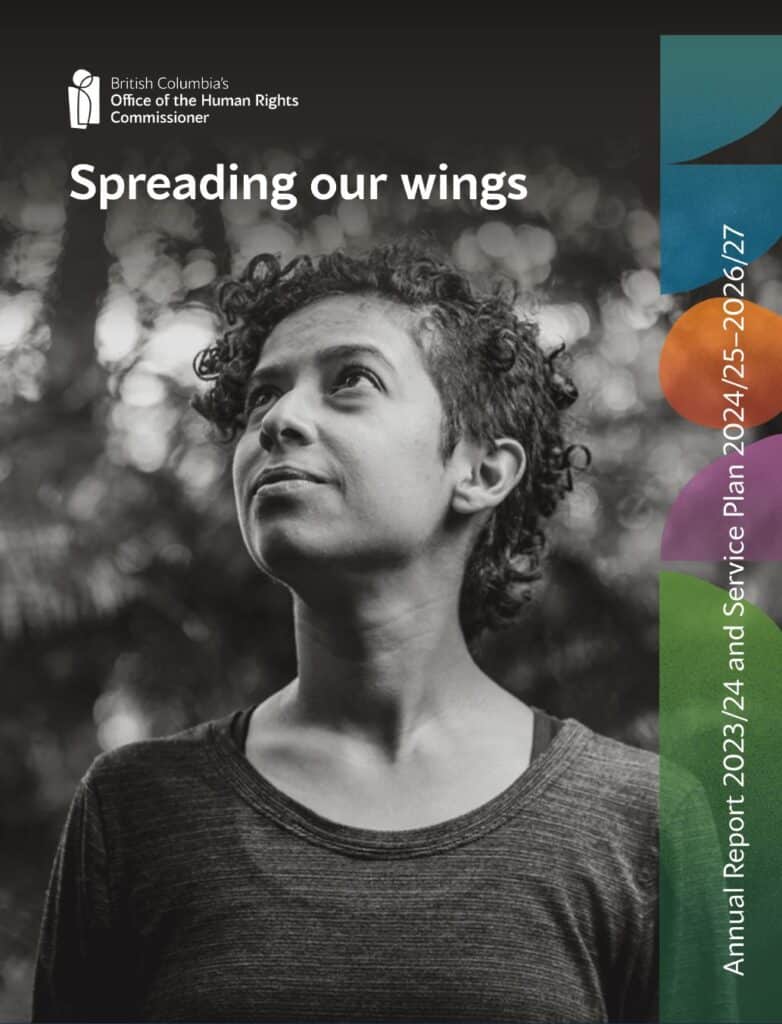A key accountability mechanism for our work is the Commissioner’s yearly budget, service plan and annual report submission and presentation to the all-party Select Standing Committee on Finance and Government Services of the Legislative Assembly of B.C.
A three-year Service Plan (2024/25–2026/27) flows from our Strategic Plan and outlines the objectives and activities we envision undertaking in each of our priority areas in order to fulfill the Commissioner’s mandate.
Our Annual Report (2023/2024) tells the story of our work and outcomes resulting from the previous fiscal year. As we grow as an organization, we plan to use our annual reports as an opportunity to highlight the impact our work is having on human rights, balancing numbers with stories and context to ensure a human rights-based approach to evaluation. We will ask people in British Columbia to work with us to tell our story of change.
For desktop viewers, we recommend setting your pdf reader to two-page view.
More resources
*If the version available via this page is not accessible for you, please feel welcome to contact our Office to request a printed copy or another format that meets your needs.

Executive summary
In 2023/24, BC’s Office of the Human Rights Commissioner (BCOHRC) focused on expanding, spreading and embedding our practices, programs and activities, with a view to creating and sustaining transformative change. The following are highlights from our 2023/24 work.
Strategic priority highlights
Reimagining human rights in B.C., our five-year strategic plan for 2020/21 through 2024/25, is the roadmap for the Office’s efforts to support and advance human rights across B.C. It describes five program-related priorities:
- discrimination under B.C.’s Human Rights Code
- decolonization
- hate and the rise of white supremacy
- poverty as a cause and effect of inequality and injustice
- human rights protections for those being detained by the state
The following are highlights from our 2023/24 work in these key areas.
Discrimination
A key reason that BCOHRC exists is to ensure that the rights guaranteed by B.C.’s Human Rights Code are protected and respected. In support of these rights, in 2023/24 we:
- engaged in community-embedded research in four regions of B.C. to understand people’s experiences of human rights issues, solutions and success stories from communities where human rights research does not tend to occur
- launched the third video in our Human Rights in B.C. series, which introduces the impacts of systemic discrimination in our communities
- released our ‘recommendations database’, which catalogues nearly 1,700 human rights recommendations about British Columbia
- created a new web portal at bchumanrightssystem.ca to help people navigate the three parts of B.C.’s human rights system based on their needs
Read page 14 of the full annual report for further details about our work on discrimination under B.C.’s Human Rights Code.
Decolonization
Decolonization is central to the work of human rights in our society, and consequently to the work of BC’s Office of the Human Rights Commissioner. Our Office is committed to supporting Indigenous rights to self-determination and governance, including meaningful respect for Indigenous legal systems and ways of knowing. This starts by listening deeply to Indigenous peoples and working to change and improve structures that impede their full, equal and just participation.
In 2023/24, the Commissioner:
- appeared before the B.C. Supreme Court in two cases involving the Province’s duty to consult First Nations before granting mineral tenures on their traditional territories
- intervened in a case before the B.C. Supreme Court that will impact how issues of discrimination are dealt with in matters concerning child protection
- released an interim report on the progress of an agreement between Maxwell Johnson, the Vancouver Police Board (VPB) and the Heiltsuk Nation to address systemic anti-Indigenous racism in policing
- continued to listen deeply and engage with Indigenous communities and leaders, meeting with representatives from several First Nations and Indigenous organizations
Read page 20 of the full annual report for further details about our work on decolonization.
Hate
Our Office combats hate by engaging in activities that build empathy, curiosity and connection across difference while using the Commissioner’s powers to issue orders, make recommendations, advocate for change and advance public inquiries. In 2023/24, we:
- followed up on the release of our Office’s groundbreaking Inquiry into Hate in the Pandemic by hosting community dialogue events, co-creating murals in four communities and developing an immersive exhibit that toured the province
- intervened in a case to ensure that the Human Rights Tribunal remains an effective venue where alleged online hate crime victims can turn
- condemned marches that called for the erasure of trans and LGBTQ2SAI+ people from the province’s educational resources
- called for action to counter rising antisemitism and Islamophobia
Read page 24 of the full annual report for further details about our work on hate and the rise of white supremacy.
Poverty
We are committed to working towards effective protections for economic rights, engaging with poverty as a human rights issue and dismantling discrimination against people living in poverty. In 2023/24, our Office:
- conducted more than 50 meetings on the subject of homeless encampments and the rights of people experiencing poverty
- published plain language educational materials about rights and responsibilities of tenants and landlords or property managers under B.C.’s Human Rights Code
- previously intervened in a case to address the legal test for family status discrimination in B.C., which in 2023 affirmed broader protections for parents and caregivers in the workplace
Read page 28 of the full annual report for further details about our work on poverty as a cause and effect of inequality and injustice.
Detention
Our Office believes that we all have the right to be free from arbitrary detention, abuse of power and other unfair treatment if we are detained by the police, in correctional centres, under community supervision or in mental health systems. In 2023/24, we:
- launched an inquiry into involuntary detentions under the Adult Guardianship Act (AGA)
- advanced work to implement recommendations from our 2021 Equity is Safer report, which revealed a disturbing pattern of discrimination in policing in B.C.
- launched an inquiry to quantify the use of force by police against racialized people and people with mental health issues, building on findings from Equity is Safer
- launched an inquiry into an alleged media exclusion zone to safeguard the rights of marginalized communities and uphold the principles of press freedom
Read page 32 of the full annual report for further details about our work on human rights protections for those being detained by the state.
Highlights of our 2022/23 impact
To measure the impact of our work and its consequences for human rights across B.C., BCOHRC has developed an evaluation and impact framework centered on five concepts:
- building respectful and accountable relationships
- creating accessible and relevant public education materials
- providing recommendations to decision-makers on ways to improve systemic human rights issues
- developing legal arguments to influence case law
- building human rights-based policies, practices and culture
Below we share highlights of our 2023/24 impacts in these key areas.
Respectful relationships
The quality of our relationships will tell the story of our impact. In the 2023/24 period, BCOHRC received more than 850 incoming calls, emails and letters from members of the public. In addition, the Commissioner reached more than 2,000 people through external speaking engagements and conducted significant community and Indigenous engagement work across the province (read page 37 for more details).
Public education
BCOHRC uses a wide variety of educational content to reach our audiences with the right information to influence attitudinal and behavioural change. In 2023/24, our Office launched 16 new educational products on a variety of topics important to people in British Columbia (read page 41 for more details).
Recommendations to decision makers
Our Office provides guidance and recommendations to duty holders—including elected officials, government leaders and responsible parties in other sectors—to help ensure systems cease to disadvantage and discriminate against marginalized communities. In 2023/24 we had over 158 external meetings regarding law and policy reform, including 89 meetings with government bodies, 46 with non-profit groups and community partners, 14 with provincial organizations and 11 with the education sector (read page 46 for more details).
Legal arguments
BCOHRC aims to improve human rights laws and systems in B.C. by holding public legal inquiries and intervening in court cases that may have a systemic impact on human rights. In 2023/24, the Commissioner intervened in three court cases: Gitxaala Nation v. Chief Gold Commissioner of B.C. et. al. and Ehattesaht v. His Majesty the King in right of B.C. et al., Vancouver Aboriginal Child and Family Services Society (VACFSS) v. R.R. and British Columbia Teachers’ Federation (BCTF) on behalf of Chilliwack Teachers’ Association v. Neufeld. Following a previous intervention by the Commissioner, the Court of Appeal’s decision in Gibraltar Mines Ltd. v. Harvey affirmed broader protections for parents and caregivers in the workplace. BCOHRC also launched three public inquiries to shine a light in areas where there has been limited public scrutiny and limited access to information (read page 48 for more details).
Human rights-based policies, practices and culture
2023/24 marks the fourth year of growth for BCOHRC. While we are growing quickly, we do so with a view to building an Office that is sustainable, with the structures and processes in place that support current needs and be adaptable to future growth. The Office’s operations have been maturing through a review of roles, adding new positions and creating a corporate services department to lead finance, IT and human resources. To support this growth, we launched an internal intranet site and a project management framework and tools and completed an equity, diversity and inclusion and organizational review (read page 50 for more details).
Looking ahead: 2024/25–2026/27 service plan
Our service plan (2024/25–2026/27) flows from the above-mentioned strategic priorities and evaluation plan. It outlines the objectives, key performance indicators and a sample of the activities we envision undertaking over a three-year period to fulfil the Office’s mandate and to establish a baseline for setting future targets.
Some of our activities in the service plan period include:
- ongoing regional engagement to connect with communities across B.C.
- developing a public awareness campaign on the impact of mis- and disinformation
- releasing a report on the key human rights issues facing British Columbia
- releasing final reports from our Office’s three current inquiries
- submitting applications for leave to intervene in additional cases, as capacity permits
- publishing a five-year evaluation of BCOHRC’s strategic plan and the Office more broadly
- publishing a new strategic plan for the next five years
Read page 53 of the full annual report for detailed tables of current and planned activities.
Budget and expenditures 2022/23
The 2023/24 operating budget for BC’s Office of the Human Rights Commissioner was $7.505 million and the capital budget was $35,000. Actual operating expenditure was $6.973 million, returning approximately $0.532 million to general revenue.
Going forward, in the period covered by our service plan, we have been approved an operating budget of $7.608 million in 2024/25, $7.608 million in 2025/26 and $7.608 million in 2026/27 and a capital budget of $35,000 per year.
For more about how we developed our organization and made an impact in 2023/24—and about what we are planning in the years ahead—please read our full annual report, Spreading Our Wings (PDF, 13MB).
- Previous publication:Rights in Focus: Lived realities in B.C.
